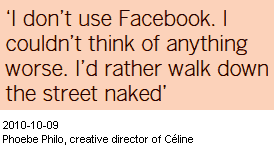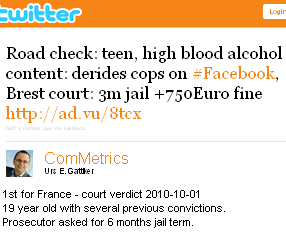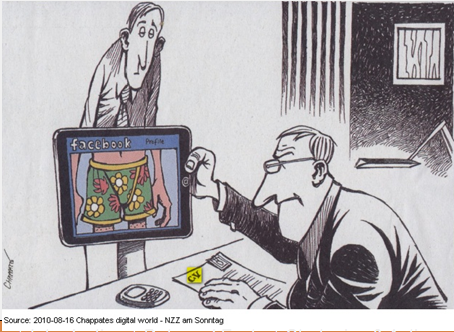This blog post focuses on Facebook, social media monitoring, social media marketing and privacy issues, as well as relationships, friending and unfriending in cyberspace.
In a recent interview Phoebe Philo, Creative Director at Céline – part of the LVMH group, said she has not embraced social media. About using Facebook, she said,
 Then I came across some interesting research by Christopher Sibona about friending and unfriending people on Facebook.
Then I came across some interesting research by Christopher Sibona about friending and unfriending people on Facebook.
Find out what I learned below and change your Facebook strategy accordingly.
The number one reason people dump friends on Facebook is because they get fed up with seeing too many useless posts.

Posts about polarizing subjects such as politics and religion as well as inappropriate and racist comments also sever many Facebook relationships.
- What is the research about?
Ph.D. student Christopher Sibona recruited participants via Twitter asking them to fill out a survey. The questions focused on respondents’ online and offline behavior regarding friending and unfriending others on Facebook.
Check out the survey instrument: Facebook study: Usage and unfriending – online survey (data collection continues)
Data collection for the study mentioned in the press release was from April through September. There are some nice presentation slides about the results here:
- Update: Since the NYT choose to include the above link in one of their stories (online and in print on October 24, 2010, on page ST6 of the New York edition), we removed the slides. If you wish to get them, please write a comment below, we try to let you have them via e-mail. Sorry about the inconvenience.
- What do the results say about Facebook friending and unfriending?
“Seventy-two percent of people who unfriended a Facebook ‘friend’ based on their behavior on Facebook agreed that the person posted unimportant topics online.”
Another interesting finding is that “…when a person indicates that they unfriended someone for offline reasons, they disliked their behavior and experienced a larger change in their relationship compared to those who selected online reasons for unfriending.”
Using covariate analysis, Sibona’s study discovered some interesting group differences that warrant further research. For instance, respondents residing in the US agreed less often that somebody posted too often about everyday life compared to those residing outside the US. But this difference might vary again if one were to compare the US with respondents from Canada and the UK (e.g., due to cultural differences or similarities).
Also, the more people saw each other within the last 12 months, the less likely they were to agree that the person they unfriended posted about polarizing topics.
The longer survey respondents used social networks, the more likely they were to agree that they had experienced a negative change in the relationship.
- Free report
I suggest you get the complete report; it is definitely worth a careful read. All you need to do is leave a comment below, and your email address with the comment form – your address will NOT be published. You will receive a link for downloading from our servers, since we cannot distribute it openly until it is published in January 2011.
- Issues for future research
While Sibona cautions us about drawing any conclusions regarding his exploratory research, the findings are very interesting.
His study raises some issues about future work investigating how various moderators might affect friending and unfriending, such as:
- – older users and other online social networks (OSNs), such as Xing, LinkedIn, Identi.ca, Google Buzz, or Twitter,
– individual differences among targets (e.g., the one looking to friend vs. the one being asked),
– gender and education, as well as
– using an OSN for business or private reasons (i.e. people who keep separate profiles might differ from others…).
For instance, could it be that people who are more similar (e.g., gender and age) are less likely to unfriend each other or would the answer again be influenced by how many ‘friends’ one already has.
- Resources: Facebook profiles reflect actual personality, not self-idealization, Facebook under the privacy microscope, Facebook – update location, opt-out of service with short video (see Saturday)
By the way, the research reached 7,327 people through tweets, of whom 2,865 began the process of answering the online survey and 1,553 (54.2 percent) completed it, meaning 45.8 percent of those who started the survey failed to complete it.
What is your take? How do you see these issues?
Please let us know in the comments!
Article source: ComMetrics – Facebook: Friending, unfriending and being naked
Watch the video below for a summary of this post and more comments about the research.


Pingback: Urs E. Gattiker
Pingback: CyTRAP
Pingback: Askoli -rise with us
Pingback: Chris Isaac
Pingback: CyTRAP
Pingback: World Economic Forum
Pingback: ROSE KEMPS
Pingback: World Economic Forum
Pingback: MyComMetrics
Pingback: Urs E. Gattiker
Pingback: CyTRAP
Pingback: Kai-Christian
Pingback: CyTRAP
Pingback: Urs E. Gattiker